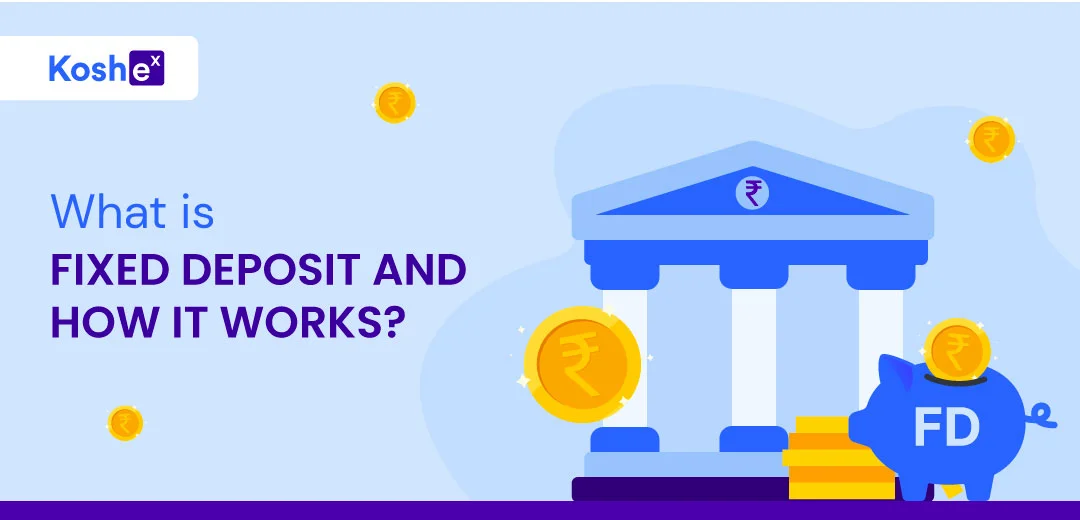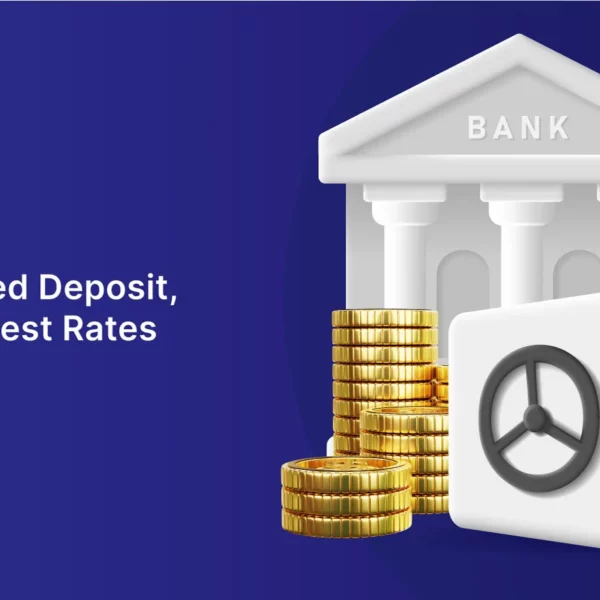Fixed deposits are one of the most loved saving instruments by many Indians.
If you are new to the savings game, you should know what fixed deposits are and how they can help you achieve your goals and reduce your taxes.
Here’s a guide to help you understand everything about fixed deposits.
What Is A Fixed Deposit?
A fixed deposit, also known as FD, is an investment instrument offered by banks and non-banking financial companies (NBFCs).
Considered to be one of the safest investment options, FDs are loved by many Indians. When you open an FD account, you can invest a sizeable amount of money at a predetermined rate of interest for a fixed period.
At the end of the fixed deposit period, you will receive the lump sum amount, along with interest.
Banks offer different rates of interest for an FD account. The interest rate depends on the type of banks (public sector, private sector, or small finance banks).
Generally, senior citizens are offered higher interest rates. The interest you earn on your FD is either paid at maturity or on a periodic basis depending on your choice.
However, you cannot withdraw the money before maturity and if you wish to withdraw your money, you would have to pay the penalty to do so.
Fixed deposits’ period ranges from a minimum of 7-14 days to a maximum of 10 years. This is why a fixed deposit is sometimes called a term deposit.
How Do Fixed Deposits Work?
Just like everyone in this world, banks too need money to function. They require funds to offer as loans to their customers.
One of the ways in which banks can obtain money is through fixed deposits for which they offer certain rates of interest. The difference between the interest rate on FDs and loans is called the spread,
which is the earnings of the bank.
The interest offered by the bank depends on the maturity period of the FD. A 7-day FD will offer you a lower annual interest rate than a one-year FD.
You can choose to either reinvest the interest or receive an interest amount periodically in your bank account.
Cumulative fixed deposits
In these fixed deposits, you will receive the interest and the principal at maturity. The interest is reinvested every year, meaning that you will not be receiving any regular interest payouts.
Instead of regular payouts, you will receive a lump sum at the end of the FD tenure.
If you are someone who doesn’t require a regular stream of income, then the cumulative FD option might be suitable for you.
You can also benefit from the power of compounding under this option, with the following year’s interest being calculated on the principal plus interest of the previous year.
Non-Cumulative fixed deposits
In these FDs, you will be paid interest at fixed intervals. You could choose to receive interest payments every month, every quarter, every six months, or every year, depending upon your requirements.
This FD is suitable for those who require a regular stream of income. The only disadvantage of non-cumulative FDs is that you will lose out on the benefit of compound interest.
Types Of Fixed Deposits
Before you invest in any FD, it is important to understand the different types of FDs that are available.
Standard Fixed Deposits
Standard FDs are investment schemes wherein you can invest an amount for a fixed period and a predetermined interest rate.
The fixed term for the FD can range from 7 days to 10 years. The fixed and pre-determined interest rate of an FD is higher than that of a regular savings account.
You can avail of loan and overdraft facilities against standard FDs. In these FDs, you can withdraw your money before the account matures but you will be levied a penalty for that.
Tax-Saving Fixed Deposits
These FDs are eligible for tax deductions and have a mandatory lock-in period of five years. Since it comes with a lock-in period, you cannot withdraw your money prematurely.
The principal amount, up to ₹1,50,000 per annum is tax deductible under Section 80C of the Indian Income Tax Act. Meanwhile, you can not avail of loan and overdraft facilities against tax-saving FDs.
Recurring Deposits
A recurring deposit or RD is a type of fixed deposit where you can invest a fixed sum monthly or quarterly for a specified time.
The interest rate is predetermined by the bank. You will receive your maturity amount with interest at the end of the maturity period.
Corporate Fixed Deposits
Some companies or corporate entities offer fixed deposits called corporate fixed deposits. They offer higher returns than banks and NBFCs but these FDs also come with higher risks.
Corporate FDs don’t have any backing and insurance coverage from the DICGC (Deposit Insurance and Credit Guarantee Corporation).
One thing that you have to be cautious of here is that if the company goes bankrupt, there is no guarantee that your money in corporate FDs can be recovered.
Senior Citizen Fixed Deposits
These fixed deposits are for people above 60 years old. These FDs offer a higher interest rate than Standard FDs, usually offering about 25-50 basis points more.
These FDs offer an additional tax benefit. Interest from these FDs does not carry a tax deducted at source if it doesn’t exceed ₹50,000 a year. The tenure of these FDs can range from 10 days to 10 years.
Flexi Fixed Deposits
A Flexi FD is linked to your savings account, as you can ask your bank to automatically transfer any sum beyond a predetermined balance to an FD through an auto sweep-in feature.
For example, if you wish to maintain a balance of ₹15,000 every month in your bank savings account, any excess amount from your account will be transferred to an FD.
At the same time, if your balance goes below ₹15,000, your bank will liquidate a portion of your FD to maintain your balance.
Hence, Flexi FDs provide the convenience and flexibility of an FD and a savings account. The interest on these FDs is higher than the interest rates offered by the bank savings account but they are lower than that of the standard FD rates.
Benefits Of Fixed Deposits
- Easy To Invest – It is easy and quick to open a fixed deposit account, as you can start investing via online or offline mode.
- Assured Returns – Unlike investment instruments, which are linked with the stock market, fixed deposits offer guaranteed returns. Your capital remains safe and secure in FDs and you will receive returns that are higher than those of bank saving accounts.
- Power Of Compounding – In FDs, you can earn interest on interest, thus receiving higher returns and witnessing faster growth of your money.
- Low Investment Amount – You can open a fixed deposit account for as low as ₹500 in many banks.
- Liquidity – Even though you have to pay a penalty for premature withdrawal, you can choose to withdraw your FD amount anytime.
- Save Tax – With fixed deposits, you can save taxes under Section 80C of the Income Tax Act of India 1961 for a sum of up to ₹1,50,000.
- Flexible Tenure – You can choose to open an FD account for a period of 7 days to 10 years.
In The End…
Fixed deposits are one of the safest investment options for any type of investor – from newbies to experts.
If you are looking to invest in FDs, head over to Koshex and create an account to start saving in Corporate Fixed Deposits. You can start making higher returns in just a couple of clicks with Koshex.
Also, Koshex has an amazing calculator, that helps you calculate how much interest and maturity amount you can earn by putting your money in FDs. Check out our easy-to-use FD calculator today!









Leave a Comment